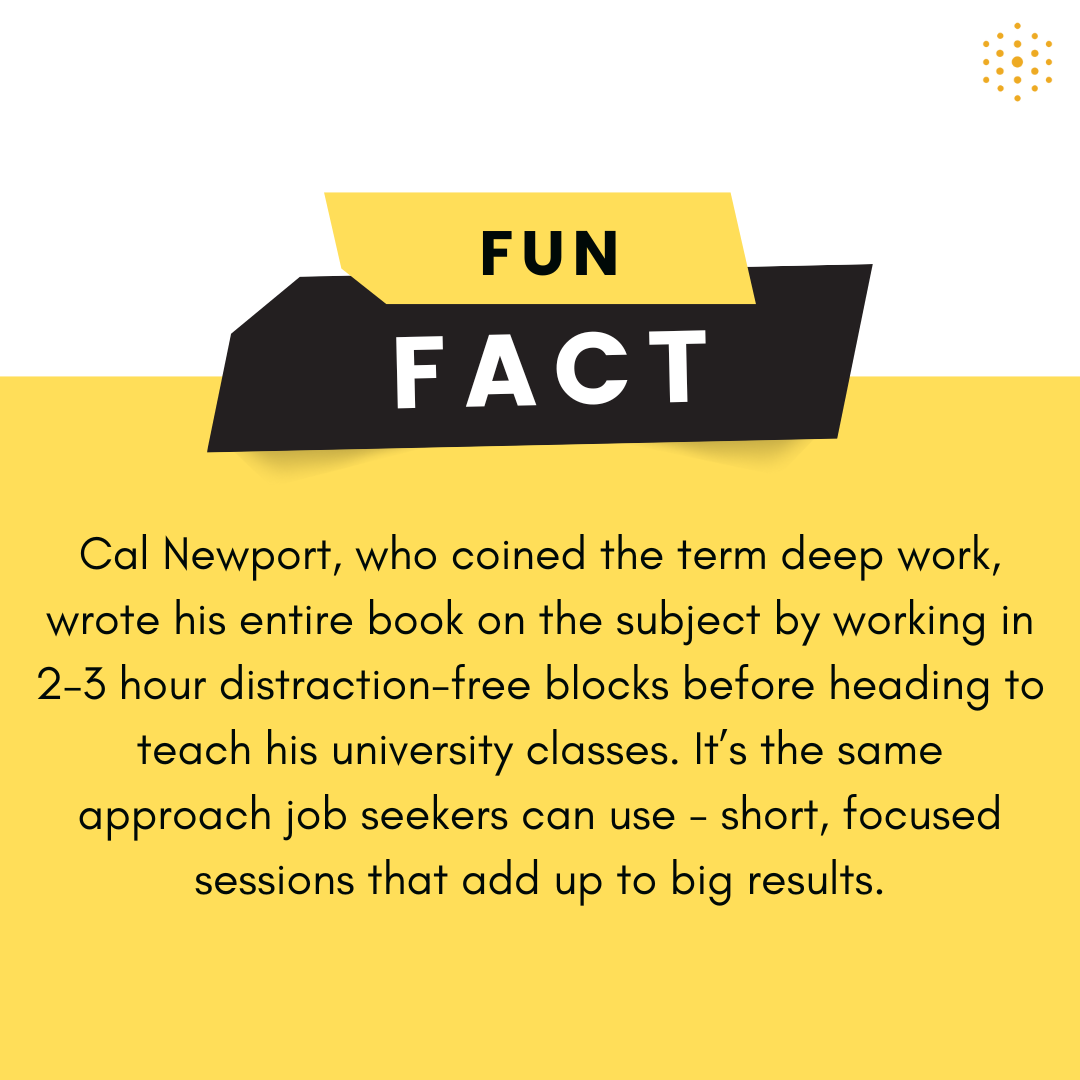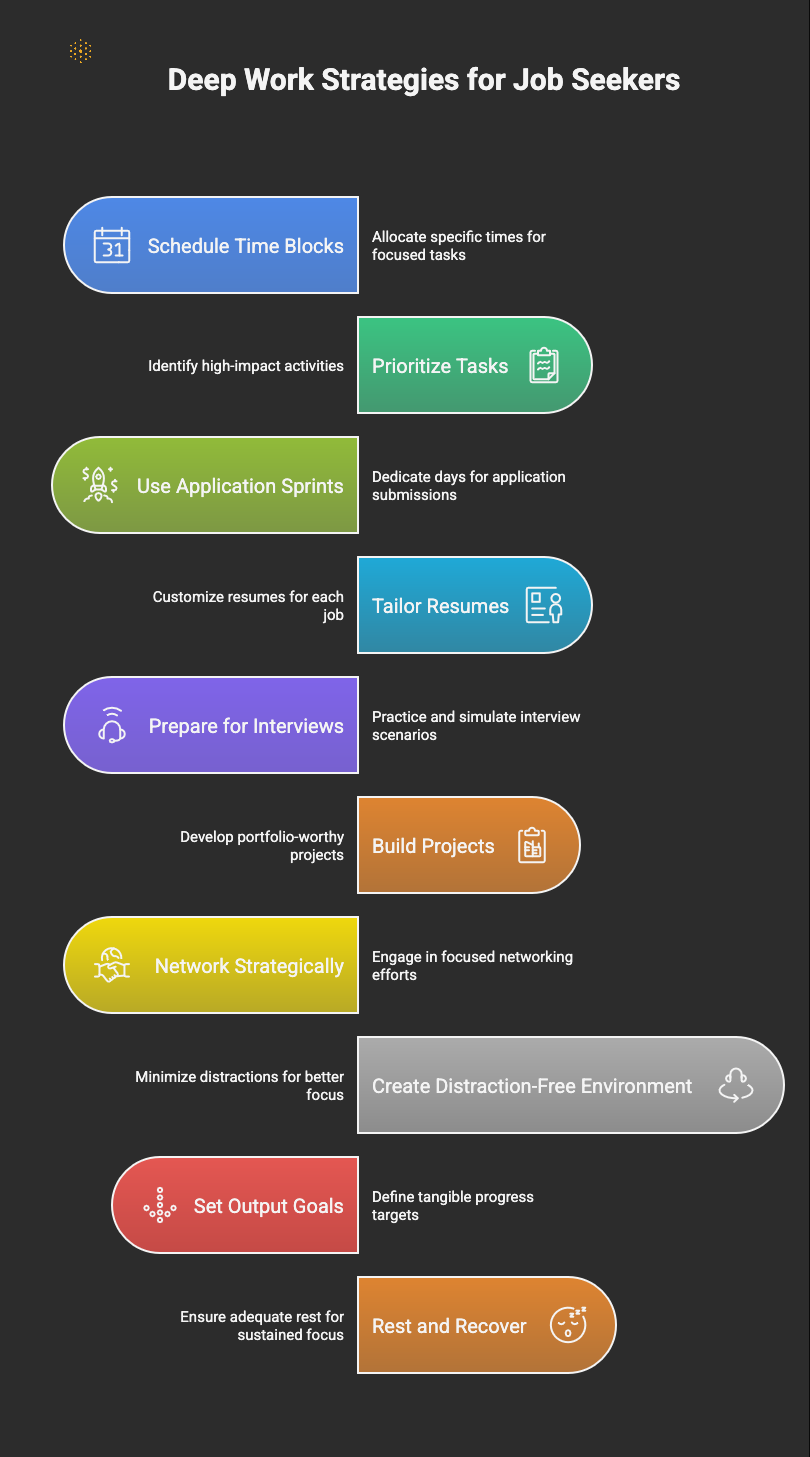How can a job seeker apply deep work to improve results?
Structure your job search with deep work by blocking focused time for high impact tasks and batching applications into sprints. Tailor materials, practice interviews, build projects, and network deliberately; set output goals and guard recovery.
Job seekers spend 11 hours a week on average looking for work, but nearly half of that time is lost to unstructured, low-value tasks like endlessly scrolling job boards or tweaking resumes without direction.
At the same time, studies shows the average posting receives 250+ applications, with only 4-6 candidates land an interview.
The difference isn’t luck, it’s structure. And deep work gives your job search exactly that.
So why waste precious hours on scattershot activity when those same hours, applied with deep work, can make you one of the few who stand out?
Let’s break down how you can bring deep work into every stage of your job search.
Why Deep Work Matters in Job Searching
- Quality over quantity. Spraying hundreds of generic applications rarely works. Deep focus helps you tailor fewer, higher-quality applications that stand out.
- Reduced decision fatigue. Structured deep work minimizes the stress of juggling tasks. You know what to work on, when, and for how long.
- Improved skills. By dedicating undistracted time to interview practice, resume rewrites, or portfolio updates, you sharpen abilities that compound over time.
- Mental resilience. Deep work creates a rhythm, protecting you from burnout and the discouragement of a long search.
Here's a breakdown of how you can get started:
1. Time Blocking for High-Value Activities
The first rule of deep work is to schedule it deliberately.
- Pick prime hours. Identify when your brain works best (for many, that’s mornings) and reserve this time for job-critical tasks like tailoring resumes or preparing for interviews.
- Use the 2-3 hour block rule. Deep work thrives on uninterrupted stretches. A single three-hour block of focused writing produces more than six fragmented half-hours.
- Protect the time. Treat it like a meeting with yourself. Silence notifications, block distracting sites, and let others know you’re unavailable.
Example: Instead of spreading resume updates across the week, dedicate Tuesday and Thursday mornings from 9-12 to focused job search projects only.
2. Prioritize by Impact, Not Urgency
Job seekers often mistake activity for progress. Refreshing job boards or tweaking resume margins feels productive, but rarely moves the needle. Deep work starts with clarity on impactful tasks.
Ask yourself: If I only accomplished one thing today, what would most improve my job prospects?
Typical high-impact tasks:
- Tailoring your resume to a specific role with measurable results.
- Practicing mock interviews with feedback.
- Building or polishing a project/portfolio piece.
- Expanding your network with targeted outreach.
Typical low-impact (shallow) tasks:
- Endlessly scrolling LinkedIn job postings.
- Formatting tweaks on your resume.
- Reading generic career advice blogs without applying them.
Action step: Write down your Top 3 Priorities before each deep work block. Work on them in sequence - no multitasking.

3. The “Application Sprint” Method
Most job seekers spread applications randomly across the week, interrupting deeper projects. Instead, use application sprints:
- Choose 1-2 days per week exclusively for submitting applications.
- Batch shallow tasks (filling out forms, uploading resumes, tracking jobs) into these sprints.
- Free the rest of the week for deeper efforts like tailoring materials, networking, or practicing interviews.
This method prevents shallow tasks from invading every day and lets you focus your best energy on strategic work.
4. Tailor Resumes & Cover Letters in Deep Work Mode
Generic resumes rarely win interviews. Tailoring requires real concentration: analyzing the job description, identifying relevant achievements, and rewriting bullets with targeted keywords.
Here’s how to make tailoring a deep work task:
- Extract keywords from the job posting. Highlight 8-10 core skills or responsibilities.
- Match with achievements in your past roles. Use metrics where possible (e.g., “Reduced onboarding time by 30%” vs. “Helped train new hires”).
- Rewrite 3-5 bullets to mirror the employer’s language.
- Polish the opening summary with direct alignment to the role.
Set aside a 90-minute deep work block per role for tailoring. It’s intense but far more effective than sending out 20 untailored resumes.
5. Deep Work for Interview Preparation
Interviews demand clarity of thought, confidence, and storytelling - all skills sharpened through deep practice. Instead of last-minute cramming, schedule recurring deep work sessions for prep:
- STAR Method Practice. Write and refine answers using Situation, Task, Action, Result.
- Record yourself. Use your phone or Hiration to analyze speech clarity, pacing, and filler words.
- Simulate stress. Practice under timed conditions with common questions (e.g., “Tell me about yourself” in 2 minutes).
Devote one deep work block per week to interview rehearsal. Over time, your answers become sharper and more natural.
6. Build & Showcase Projects
For technical, creative, or business roles, evidence of work is more persuasive than credentials. Deep work is ideal for producing portfolio assets:
- Coders: Complete a mini project using real-world data.
- Marketers: Build a case study of a campaign you ran.
- Designers: Refresh your portfolio with new mockups.
- Business Analysts: Publish a short whitepaper on an industry trend.
Block 2-3 hours weekly to advance one project at a time. Document progress so you can showcase it in applications or interviews.

7. Networking Through Deep Work
Networking is often dismissed as shallow work, but done strategically, it can be a deep, focused process:
- Research 5-10 professionals in your target field or company.
- Write thoughtful, personalized messages (not copy-paste notes).
- Prepare insightful questions before an informational interview.
- Reflect afterward - summarize takeaways and update your approach.
Treat networking like research and relationship-building, not just “sending requests.” By devoting deep work energy, you build authentic connections that lead to referrals.
8. Create a Distraction-Free Environment
Deep work collapses without the right environment. As a job seeker, distractions can be relentless. Here’s how to manage them:
- Digital hygiene. Close extra tabs. Use site blockers during focus sessions. Keep your phone in another room.
- Workspace cues. Even if you don’t have an office, designate a spot (a desk, a chair, even a corner) as your “job search zone.”
- Noise control. Use headphones, white noise, or instrumental playlists to reduce mental clutter.
Environmental signals help your brain enter “focus mode” faster.
9. Set Output Goals, Not Just Input Goals
Most job seekers set input-based goals: “Spend 3 hours applying.” Deep work favors output goals: “Submit 2 tailored applications with rewritten bullets and keyword alignment.”
Examples of output goals:
- Draft 1 portfolio case study this week.
- Reach out to 5 targeted professionals with personalized notes.
- Rewrite 10 resume bullets with measurable outcomes.
Output goals keep deep work grounded in tangible progress.
10. Rest and Recovery
Deep work is taxing. Without rest, your focus decays. Protect recovery time to sustain your job search marathon:
- End each block with a shutdown ritual. Write down what you accomplished and what’s next.
- Schedule breaks. 5-10 minutes each hour; longer breaks between sessions.
- Sleep. Focus quality drops sharply when you’re under-rested.
- Exercise. Even light walks restore clarity and motivation.
Think of recovery as a productivity tool, not a luxury.
Putting It All Together: A Sample Weekly Deep Work Plan
Here’s how you can structure your week:
- Monday (Morning): Tailor 2 applications (deep work).
- Monday (Afternoon): Submit applications + track (shallow sprint).
- Tuesday (Morning): Interview prep (deep work).
- Wednesday (Morning): Networking research + outreach (deep work).
- Thursday (Morning): Portfolio project development (deep work).
- Friday (Morning): Tailor resumes/cover letters for high-priority roles (deep work).
Afternoons reserved for application sprints, follow-ups, or shallow tasks.
Conclusion
A job search can feel endless if you scatter energy across low-value activities. Deep work flips the script.
By blocking time, prioritizing impact, tailoring materials, practicing interviews, and building authentic networks, you transform the search from reactive to strategic.
Hiration helps job seekers put these strategies into action - streamlining resumes, cover letters, interview prep, and more - so focus stays on what really counts.
In the end, a disciplined, focused approach won’t just improve your job search - it will make the process less stressful and far more rewarding.
Frequently Asked Questions
-
What is deep work in a job search and why does it matter?
Deep work gives your job search structure and focuses effort on results. It helps you tailor fewer, higher-quality applications, reduces decision fatigue, improves skills, and builds resilience against burnout.
-
How should you time block deep work for job searching?
Schedule it deliberately during your prime hours and protect the time from distractions. Use the 2-3 hour block rule.
-
What is the Application Sprint method?
Choose 1-2 days per week exclusively for submitting applications and batch shallow tasks into those sprints. Free the rest of the week for deeper efforts like tailoring materials, networking, or practicing interviews.
-
How do you tailor resumes and cover letters using deep work?
Set aside a 90-minute deep work block per role for tailoring. Extract keywords, match achievements with metrics, rewrite 3-5 bullets, and polish the opening summary for keyword alignment.
-
What are examples of high-impact and low-impact job search tasks?
High-impact tasks include tailoring your resume to a specific role, practicing mock interviews, building a project, and targeted networking. Low-impact tasks include endlessly scrolling LinkedIn job postings, formatting tweaks, and reading generic career advice blogs without applying them.
-
How can you prepare for interviews using deep work?
Devote one deep work block per week to interview rehearsal. Use STAR Method practice, record yourself, and simulate stress with timed answers.
-
How do you build and showcase projects during a job search?
Evidence of work is more persuasive than credentials. Block 2-3 hours weekly to advance one project at a time and document progress to showcase it in applications or interviews.
-
How do you create a distraction-free environment for deep work?
Use digital hygiene: close tabs, block sites, and keep your phone in another room. Add workspace cues and noise control to help your brain enter focus mode faster.
-
What output goals should you set for your job search?
Deep work favors output goals: Submit 2 tailored applications with rewritten bullets and keyword alignment. Reach out to 5 targeted professionals with personalized notes.
-
What rest and recovery practices support deep work?
End each block with a shutdown ritual and write down what you accomplished and what’s next. Schedule breaks of 5-10 minutes each hour and use sleep and exercise to sustain focus.



